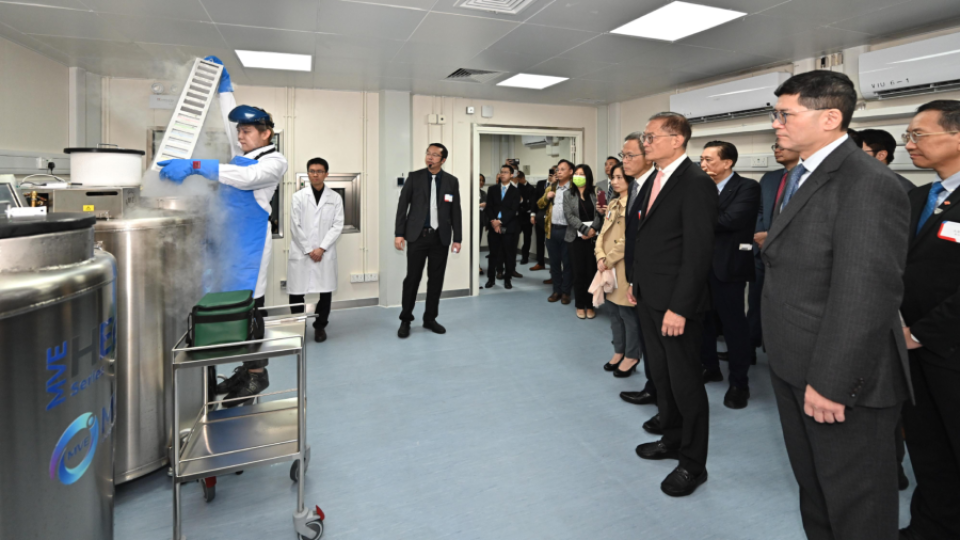November 22, 2024
HONG KONG – Hong Kong and Shenzhen authorities on Thursday launched a clinical trial institute and a clinical trials center at the twin science park located in the Lok Ma Chau Loop, in the hope of jointly expediting clinical trials of innovative drugs and attract top-notch innovative companies and research institutions to establish a foothold in the city.
The Greater Bay Area International Clinical Trial Institute, which is temporarily housed at the Central Government-Aided Emergency Hospital in Lok Ma Chau, will move into one of the wet lab-enabled buildings in the Hong Kong Park of the Hetao Shenzhen-Hong Kong Science and Technology Innovation Co-operation Zone (HTCZ) in 2025.
In the Shenzhen Park, the Greater Bay Area International Clinical Trials Center of the Shenzhen Municipality was also officially opened on Thursday.
READ MORE: Shenzhen to prioritize AI, NEV, biomedical industries
The opening of the “one institute, one center” marked the first benchmark for coordinated development under the “one zone, two parks” of the HTCZ, according to the Hong Kong government.
The institute and the center will jointly form GBA Clinical Trial Collaboration Platform to expand research and development network and accelerate clinical trials, and provide support to pharmaceutical research and development organizations at home and abroad.
The platform is aimed to coordinate the launch of multi-center cross-boundary clinical trials, and enable these clinical trials can meet both national and international standards.
At the opening ceremony of the institute and the center, Deputy Chief Secretary for Administration, Cheuk Wing-hing said that given the institute’s strategic location in the Hetao area, it will take best advantage of Hong Kong’s unique advantages of a high degree of internationalization, high-level healthcare professions and scientific research.
Cheuk said the institute will spare no effort to develop new quality productive forces tailored to local conditions by promoting clinical trials and development of the biomedical technologies industry, hence employing Hong Kong’s strengths to serve the nation’s needs.
Cheuk added that he is convinced that the institute will be an accelerator for the city to become an international innovative biomedical hub, level up Hong Kong’s capacity in clinical trials and promote the transition of innovative biomedical research results, as well as attract first-class innovative enterprises and research facilities.
The Director General of the Public Hygiene and Health Commission of Shenzhen Municipality Wu Hongyan, in a video speech, expressed her hope for close integration between Hong Kong and Shenzhen to capitalize on their mutual strengths in the areas of industry, translation, market, talent and scientific research through the establishment of “one institute, one center”, jointly building a high-level clinical trial service platform.
Hong Kong Secretary for Health Lo Chung-mau said the institute offers an expanded array of services and facilities to innovation and technology institutions and enterprises.
The size of the institute, once relocated, will be expanded from the current 7,000 to 20,000 square feet.
The institute, which will be run by the University of Hong Kong’s Li Ka Shing Faculty of Medicine, is equipped with an affiliated biobank, with the capacity to store over 400,000 samples from about 10,000 donors, including samples such as tissues, blood, cells and DNA.
The trial institute’s data and biological samples will be restricted to sharing within Hetao, striking a balance between data security and efficiency, Lo said.
Lau Chak-sing, dean of the LKS Faculty of Medicine, said that the inaugural research project taking place at the trial center is the Phase II clinical trial of therapeutic HIV vaccine. Lau noted that it used to take about two to three years to conduct one phase of a trial, and it is hoped that the trial institute can expedite the process.
The trial institute will also promote talent development, including the incorporation of clinical research into the curriculum for medical students, Lau added.
READ MORE: HK an emerging innovation hub with global potential
The biobank, a key facility of the institute, is equipped with two liquid nitrogen (gas phase) storage and 11 ultra-low temperature freezerswhich are maintained at temperatures of around -80 degrees Celsius.
Director (Quality and Safety) of the Hospital Authority Michael Wong Lap-gate noted that with the newly established biobank, samples that are not fully used can be preserved for years for future research by other scientists or pharmaceutical companies, instead of being discarded as they were previously. This is particularly important for samples related to rare diseases in Hong Kong as patient samples often take years to accumulate, he added.
The initiative to establish the institute was put forward by Hong Kong Chief Executive John Lee Ka-chiu in his Policy Address 2023, in a bid to provide a one-stop clinical trial support platform for medical research institutions to co-ordinate clinical trial resources in the public and private healthcare sectors in Hong Kong, including researchers, supporting services, data banks, sample banks, laboratories.


